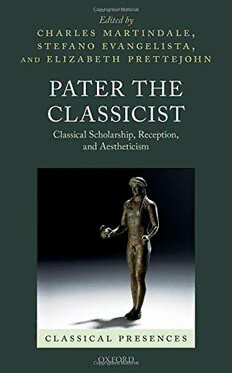Table Of ContentCLASSICAL PRESENCES
GeneralEditors
LORNA HARDWICK JAMES I. PORTER
CLASSICAL PRESENCES
Attemptstoreceivethetexts,images,andmaterialcultureofancientGreece
and Rome inevitably run the risk of appropriating the past in order to
authenticatethepresent.Exploringthewaysinwhichtheclassicalpasthas
beenmappedoverthecenturiesallowsustotracetheavowalanddisavowal
of values and identities, old and new. Classical Presences brings the latest
scholarship to bear on the contexts, theory, and practice of such use, and
abuse,oftheclassicalpast.
Pater the Classicist
Classical Scholarship, Reception,
and Aestheticism
EDITED BY
Charles Martindale, Stefano Evangelista,
and Elizabeth Prettejohn
1
OUPCORRECTEDPROOF–FINAL,3/1/2017,SPi
3
GreatClarendonStreet,Oxford,OX26DP,
UnitedKingdom
OxfordUniversityPressisadepartmentoftheUniversityofOxford.
ItfurtherstheUniversity’sobjectiveofexcellenceinresearch,scholarship,
andeducationbypublishingworldwide.Oxfordisaregisteredtrademarkof
OxfordUniversityPressintheUKandincertainothercountries
©OxfordUniversityPress2017
Themoralrightsoftheauthorshavebeenasserted
FirstEditionpublishedin2017
Impression:1
Allrightsreserved.Nopartofthispublicationmaybereproduced,storedin
aretrievalsystem,ortransmitted,inanyformorbyanymeans,withoutthe
priorpermissioninwritingofOxfordUniversityPress,orasexpresslypermitted
bylaw,bylicenceorundertermsagreedwiththeappropriatereprographics
rightsorganization.Enquiriesconcerningreproductionoutsidethescopeofthe
aboveshouldbesenttotheRightsDepartment,OxfordUniversityPress,atthe
addressabove
Youmustnotcirculatethisworkinanyotherform
andyoumustimposethissameconditiononanyacquirer
PublishedintheUnitedStatesofAmericabyOxfordUniversityPress
198MadisonAvenue,NewYork,NY10016,UnitedStatesofAmerica
BritishLibraryCataloguinginPublicationData
Dataavailable
LibraryofCongressControlNumber:2016948403
ISBN 978–0–19–872341–7
PrintedinGreatBritainby
ClaysLtd,StIvesplc
LinkstothirdpartywebsitesareprovidedbyOxfordingoodfaithand
forinformationonly.Oxforddisclaimsanyresponsibilityforthematerials
containedinanythirdpartywebsitereferencedinthiswork.
Preface
The project that led to this volume began with a two-day interdis-
ciplinary workshop ‘Pater the Classicist’ held in 2012 at the University
of Bristol, generously supported financially by the Bristol Institute
of Greece, Rome, and the Classical Tradition and by the University of
Oxford (Passmore Edwards Fund). Our thanks to those supportive
institutions. Apart from the contributors to this volume other partici-
pants were Elisa Bizzotto, Jason Edwards, David Hopkins, Ian Jenkins,
MiriamLeonard, CatherineMaxwell,EllenO’Gorman,RobinOsborne,
and Liz Renes. Stephen Bann was unable to attend, but subsequently
agreedtowritethe‘Afterword’.Theaimoftheworkshopwastofocuson
those writings by Pater that are directly concerned with classical
antiquity; these include Plato and Platonism and the essays on Greek
artandculture,whichingeneralhavebeenneglectedincomparisonwith
hisessaysonmodernliteratureandarthistory,particularlythoseinhis
mostcelebratedpublication,TheRenaissance,continuouslyinprintand
discussed since Pater’s death. There is as yet no really systematic treat-
mentofPaterasaclassicist,eventhoughclassicalliteratureandculture
constitutedhismainobjectofstudythroughouthislife.Oneproblemis
that today’s classicists (unlike some of their predecessors) rarely write
about Pater, while few contemporary Paterians are expert in matters
classical. Accordingly the workshop was specifically designed to bring
togetherclassicalscholarsandPaterspecialists.Wearedelightedthatas
aresult,intwocases,aclassicistandaVictorianistdecidedtocollaborate
on a jointly written chapter for our volume. More generally the work-
shop encouraged a dialogue across disciplines (Classics, English Litera-
ture,ArtHistory,Archaeology,Philosophy),promotingfreshideasand
approaches. We hope that this dialogue will continue to bear fruit,
something that is essential if the writings by Pater that themselves
cross those boundaries are to be properly understood and evaluated.
Should this project and publication lead to more work of the kind, we
shallindeedbesatisfied.
Pater, for years a tutor at Brasenose College, Oxford, was a profes-
sionalclassicist(theonlymajorcriticoftheHighVictorianperiodtobe
vi PREFACE
so), with a particular interest in philosophy. He initially approached
antiquity obliquely (for example, through the Italian Renaissance or
the poetry of William Morris). Later in his career he wrote more, and
more directly, about the ancient world, particularly about his first
love Greece, in Marius the Epicurean (centrally concerned with Greek
philosophyandculturealongwithLatinliterature,Romanreligion,and
earlyChristianity),inPlatoandPlatonism,andintheessayscollectedin
Greek Studies. The writings that deal with antiquity treated in this
volumeare,intheorderoftheircomposition(withdatesofsubsequent
collectionsinbrackets),asfollows:
1867 ‘Winckelmann’(TheRenaissance,1873,1877,1888,1893)
1876 ‘TheMythofDemeterandPersephone’intwoparts(Greek
Studies,1895)
‘Romanticism’(retitled‘Postscript’,Appreciations,1889,1890,
1895)
‘AStudyofDionysus’(GS)
1880 ‘TheBeginningsofGreekSculpture’intwoparts(GS)
‘TheMarblesofAegina’(GS)
1885 MariustheEpicurean(revisedlaterin1885,1892)
1886 ‘Denysl’Auxerrois’(ImaginaryPortraits,1887,1890)
1889 ‘TheBacchanalsofEuripides’(GS),probablywrittenc.1876–8
‘HippolytusVeiled’(GS)
1892 ‘TheGeniusofPlato’;‘AChapteronPlato’;‘Lacedaemon’
(republishedaschapters1,6,8ofPlatoandPlatonism)
1893 PlatoandPlatonism
‘ApolloinPicardy’(MiscellaneousStudies,1895)
1894 ‘TheAgeofAthleticPrizemen’(GS)
Thesewritingsrangefromliterarycriticismtoarthistory,archaeology,
philosophy,andfiction,toanextentdissolvingthedistinctionsbetween
them.Paterengaged,ifofteninacharacteristicallycovertandfelineway,
with the views of his Victorian contemporaries, challenging (if only by
implication) dominant views on critical and artistic practice, and on
religionandmorality,includingsexualmorality.Hewaslateranimport-
ant influence, not always fully acknowledged, on many of the major
anglophoneModernists,includingWoolf,Joyce,andT.S.Eliot.Andhe
hasbeenreclaimedforPostmodernismbyanumberofitsleadingfigures.
AllthesevariousPaterswillbeencounteredinthiscollection.
PREFACE vii
Quotations from the writings of Pater are cited within the text in
abbreviatedform(seep.xiforalistofabbreviations).Documentationfor
all references and citations is given in full in the notes to individual
chapters. (For books, where place of publication is not specified, it is
London.) Our volume also contains, at the end, a specially compiled
general bibliography on the subject: this provides overall guidance on
publications about Pater the classicist. For classical names, wherever
possible,weusePater’sownspellings.
Our project is particularly timely, since Oxford University Press has
commissioned a new multi-volume Pater edition, which is bound to
provokeincreasedinterestinhiswritings.PatertheClassicistisdesigned
toappealtostudentsofphilosophy,arthistory,andliterature(especially
intheVictorianperiod),aswellasthoseinterestedinclassicalreception
(currentlythefastest-growingpartofClassics,atleastintheUK),where
there is considerable attention paid at the moment to the Victorian
period.ThereisalsomuchinterestinPaterbeyondBritain,aswitnessed
by The Reception of Walter Pater in Europe edited by Stephen Bann,
whose ‘Afterword’ concludes our book (there are modern French and
Italian editions of Greek Studies, and a French edition of Plato and
Platonism, though as yet no English ones!). As both a theorist and a
distinguishedpractitionerofclassicalreception,Paterisalmostuniquely
suited to be the subject of a volume in the Classical Presences series.
Reflecting the broad range of Pater’s interests, our list of contributors
cutsacrossdisciplinaryboundaries,bringingtogetherclassicists,literary
critics, art historians, and philosophers. The team is fully international,
withcontributorsfromNorthAmerica,theUK,andcontinentalEurope,
composed of scholars at the beginning of their careers as well as those
who are fully established. We hope that this inclusive, outward-facing
approachwouldhavemetwiththeapprovalofthatmostcosmopolitan
ofwritersonantiquityandtheclassicaltradition:WalterHoratioPater.
CharlesMartindale
StefanoEvangelista
ElizabethPrettejohn
YorkandOxford,2016
OUPCORRECTEDPROOF–FINAL,3/1/2017,SPi
Contents
Abbreviations xi
ListofContributors xiii
Introduction:PaterandAntiquity 1
CharlesMartindale
Part 1. Classics and Classicism
IntroductiontoPart1 31
1. PaterasProfessionalClassicist 33
IsobelHurst
2. PatertheTranslator 47
BénédicteCoste
3. Pater’s‘Winckelmann’:AestheticCriticism
andClassicalReception 63
StefanoEvangelistaandKatherineHarloe
4. EternalMoment:PaterontheTemporality
oftheClassicalIdealinArt 81
WhitneyDavis
Part 2. Fictions
IntroductiontoPart2 101
5. TibullusinMariustheEpicurean:orHowtoRead
Pater’sFiction 103
DuncanKennedy
6. MarcustheStoicinMariustheEpicurean 121
RichardRutherford
7. ASearchforHome:TheRepresentationofthe
DomesticinMariustheEpicurean 135
ShelleyHales

